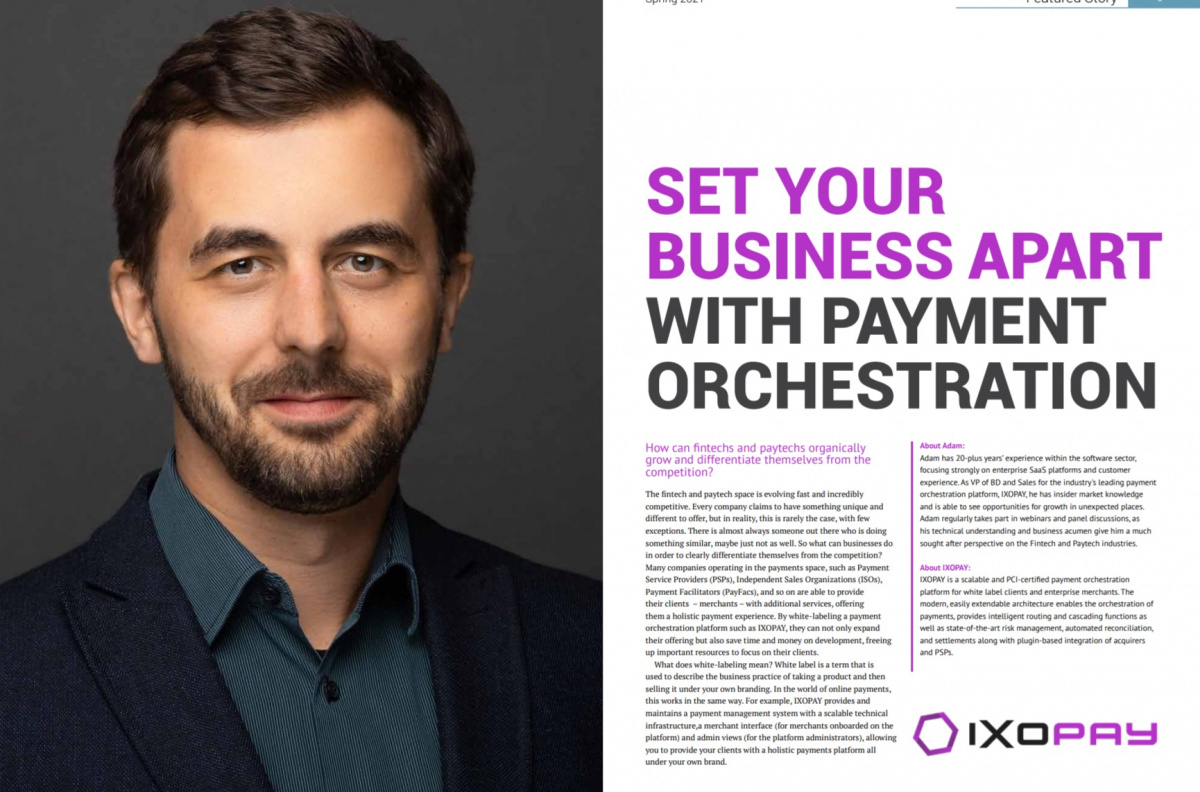Set Your Business Apart With Payment Orchestration

- Adam Vissing, VP Sales & Business Development at IXOPAY
- 28.09.2021 01:45 pm #payments #money20/20
How can fintechs and paytechs organically grow and differentiate themselves from the competition?
The fintech and paytech space is evolving fast and incredibly competitive. Every company claims to have something unique and different to offer, but in reality, this is rarely the case, with few exceptions. There is almost always someone out there who is doing something similar, maybe just not as well. So what can businesses do in order to clearly differentiate themselves from the competition? Many companies operating in the payments space, such as Payment Service Providers (PSPs), Independent Sales Organizations (ISOs), Payment Facilitators (PayFacs), and so on are able to provide their clients - merchants - with additional services, offering them a holistic payment experience. By white-labeling a payment orchestration platform such as IXOPAY, they can not only expand their offering but also save time and money on development, freeing up important resources to focus on their clients.
What does white-labeling mean? White label is a term that is used to describe the business practice of taking a product and then selling it under your own branding. In the world of online payments, this works in the same way. For example, IXOPAY provides and maintains a payment management system with a scalable technical infrastructure,a merchant interface (for merchants onboarded on the platform) and admin views (for the platform administrators), allowing you to provide your clients with a holistic payments platform all under your own brand.
What is payment orchestration?
A payment orchestration layer, or a payment orchestration platform, gives its user complete control over their payment stack. It is a technical layer that consolidates all aspects of payments processing. Meaning, beyond their core service, businesses would be able to offer access to multiple payment methods,use transaction routing with conversion-boosting features, such as cascading and failover processing, consolidate settlements and reconciliation thereof, monitor transactions in real-time to mitigate fraud and avoid false positives, tokenize customer payment data and more, all in one platform.
When a company opts for a white label payment orchestration platform, such as IXOPAY, they are getting all of these features which they can, in turn, offer to their clients. This requires no development time or maintenance costs. It is ready out-of-the-box and just needs to reflect the company branding.
Why should fintech companies white-label a payment orchestration platform?
By providing clients with a holistic service, Fintechs are able to expand their offering, increase customer retention and future proof their services to accompany their clients’ growth. Let’s take a payment service provider as an example. If a PSP were to white label a payment orchestration platform, they would not only be providing a merchant with payment processing, but with a complete payment experience. They could quickly and easily onboard merchants to the platform and create user accounts. They can then set up individual payment methods for each merchant. And even though they are using a third-party software, it is their company branding that takes center stage. ISOs, as another example, would be able to easily create new revenue streams by supplying their clients with products typically out of the scope of the “classic” ISO portfolio, such as an e-commerce payment gateway, virtual terminal and pay-by-link functionality.
There is an argument that as payment orchestration becomes more prevalent and considered best practice for merchants, companies should, instead of white-labeling a platform, build their own. This is all well and good, as many solutions may not have the flexibility and independence that businesses would like in order to truly have control over their lateral expansion. However, the time, energy, and let’s not forget capital that goes into the creation and maintenance of this software can represent a significant investment. Using a truly independent, turnkey solution will give you full control without the headache of developing and maintaining a custom solution.
What to expect from your white-label platform?
As with other types of platforms, there are plenty of white-label payment solutions on the market. So how can you find the right partner for your business? It bears repeating that independence of the supplier should be a key factor in your decision process. Working with an agnostic provider gives you the freedom to build and make connections of your choice. To put it simply, the supplier platform should have no vested interest in the payment service providers or acquirers the client chooses to work with. Meaning, the platform is there to support the client by supplying objective information about the providers, enabling them to make a decision that best suits their business model. But what else do you need to take into consideration?
To build on your hard-won brand loyalty, you want your clients to see your logo and to recognize your corporate identity. You need to ensure the platform can be fully branded and that it provides front-end integrations for any checkout scenario. Any issues the end users face will negatively impact your brand, so keep the user experience consistent. With that in mind, make sure you provide integrated fraud and risk management, which allows you to define and enforce rules that will help protect your and your clients’ revenue streams. If you choose to use a white label payments platform, you will need a complete overview of all client transactions, where and when they were processed, whether the settlements match, and clear reports on decline rates, refund rates, processed volumes, chargeback ratios, and so on. The platform that you choose should automatically store and fetch this information and be capable of generating reports and integrating with business intelligence (BI) applications. The platform should also communicate with various lines of business applications, such as ERP or CRM systems. This is best achieved through flexibly configurable ETL (Extract-Transform-Load) processes.
Things to consider when looking for a white label partner:
The benefits to white-labeling are numerous. It is the easiest way to establish and scale your business while saving time and money on development, giving you an edge over your competitors. Therefore, it bears repeating that if you do choose to expand your business offering with payment orchestration, the platform will represent you; it is important that you feel confident sticking your name on it. Find a product and partner that is reliable and you can trust. Look for a provider with a long white labeling experience and that has the flexibility to grow with you. By working with an independent solution, you will protect your autonomy. IXOPAY is an independent payment orchestration provider that offers businesses operating in the payment sector rock-solid infrastructure that can be white-labeled and used to service their merchants.
This article was originally published on Financial IT Special Money20/20 2021 Issue






















